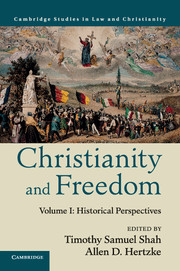Book contents
- Frontmatter
- The Religious Freedom Research Project
- Contents
- Contributing Authors
- Acknowledgments
- Introduction: Christianity and Freedom: Ancient Roots and Historical Innovations
- 1 The Roots of Religious Freedom in Early Christian Thought
- 2 The Christian Roots of Religious Freedom
- 3 Lactantius on Religious Liberty and His Influence on Constantine
- 4 Augustine and Religious Freedom
- 5 Christianity and the Roots of Human Dignity in Late Antiquity
- 6 Liberty of Conscience and Freedom of Religion in the Medieval Canonists and Theologians
- 7 Faith, Liberty, and the Defense of the Poor: Bishop Las Casas in the History of Human Rights
- 8 Calvinist Contributions to Freedom in Early Modern Europe
- 9 Constitutional Protection of the Freedom of Conscience in Colonial America: The Rhode Island and Pennsylvania Experiments
- 10 Christianity and Freedom in the American Founding
- 11 Vibrant Christian Pluralism and the Evolution and Defense of Religious Liberty in America
- 12 Orthodox Christian Contributions to Freedom: Historical Foundations, Contemporary Problematics
- 13 Christianity: A Straggler on the Road to Liberty?
- 14 Protestant Missionaries and the Centrality of Conversion Attempts for the Spread of Education, Printing, Colonial Reform, and Political Democracy
- 15 God and Freedom: Biblical Roots of the Western Idea of Liberty
- Index
6 - Liberty of Conscience and Freedom of Religion in the Medieval Canonists and Theologians
Published online by Cambridge University Press: 05 May 2016
- Frontmatter
- The Religious Freedom Research Project
- Contents
- Contributing Authors
- Acknowledgments
- Introduction: Christianity and Freedom: Ancient Roots and Historical Innovations
- 1 The Roots of Religious Freedom in Early Christian Thought
- 2 The Christian Roots of Religious Freedom
- 3 Lactantius on Religious Liberty and His Influence on Constantine
- 4 Augustine and Religious Freedom
- 5 Christianity and the Roots of Human Dignity in Late Antiquity
- 6 Liberty of Conscience and Freedom of Religion in the Medieval Canonists and Theologians
- 7 Faith, Liberty, and the Defense of the Poor: Bishop Las Casas in the History of Human Rights
- 8 Calvinist Contributions to Freedom in Early Modern Europe
- 9 Constitutional Protection of the Freedom of Conscience in Colonial America: The Rhode Island and Pennsylvania Experiments
- 10 Christianity and Freedom in the American Founding
- 11 Vibrant Christian Pluralism and the Evolution and Defense of Religious Liberty in America
- 12 Orthodox Christian Contributions to Freedom: Historical Foundations, Contemporary Problematics
- 13 Christianity: A Straggler on the Road to Liberty?
- 14 Protestant Missionaries and the Centrality of Conversion Attempts for the Spread of Education, Printing, Colonial Reform, and Political Democracy
- 15 God and Freedom: Biblical Roots of the Western Idea of Liberty
- Index
Summary
EXECUTIVE SUMMARY
The present study examines the ways in which theologians and canon lawyers in the Late Middle Ages (1150–1450) developed principles of religious freedom that applied to their fellow Christians and to non-Christians, both those within the boundaries of Western Christendom and those without. The analysis considers the related issues of tolerance, conscience, and rights, seeking to strike a balance between those fundamental liberties of the human person guaranteed under natural and evangelical law and the common good of a Christian society. The study begins by looking at juristic material regarding the rights of Jews living within the bounds of the Christian West as well as those of nonbelievers living outside Christian borders. From there, the focus turns inward to examine the treatment of dissenting Christians from both a theological and a judicial perspective before narrowing the scope even further to consider the role of the masters within the late medieval university. We discover a society that did permit a certain degree of religious nonconformity and could be considered tolerant, even if its particular form of toleration diverges from modern Western models. The medieval West, moreover, recognized that all human beings – Christian and non-Christian alike – possessed a set of inviolable natural rights that could not be lawfully infringed by ecclesiastical and secular authorities. In that regard, it does anticipate some modern conceptions of human rights, most notably those that ground such rights in an eternal divine order. This study does not attempt to gloss over or excuse the failings of medieval Christendom; it does, however, seek to understand that society on its own terms. This is a work of intellectual history that is concerned with the principles enunciated by the medieval theologians and canonists, who contributed significantly to the greater tradition of religious freedom in the West that extends into the present day.
INTRODUCTION
This essay examines the views of late medieval theologians and canonists on the matter of religious freedom. We will look at the rights and obligations of Christians, on the one hand, and non-Christians on the other. One finds that in the Late Middle Ages (1150–1450), notwithstanding coercive tactics adopted under some circumstances, there remained a consistent recognition of religious freedom secured by both divine and natural law.
- Type
- Chapter
- Information
- Christianity and Freedom , pp. 149 - 175Publisher: Cambridge University PressPrint publication year: 2016
- 1
- Cited by

